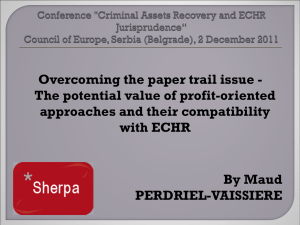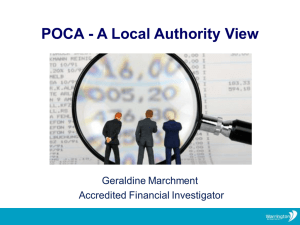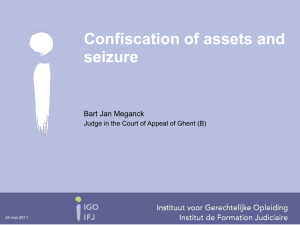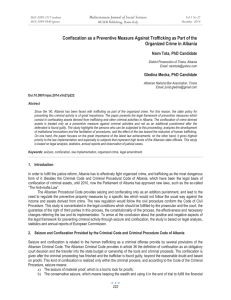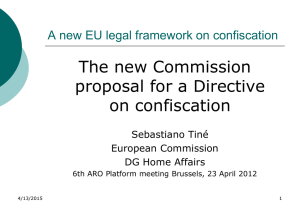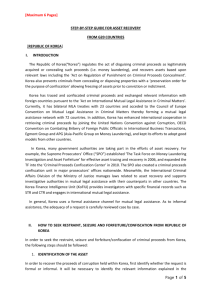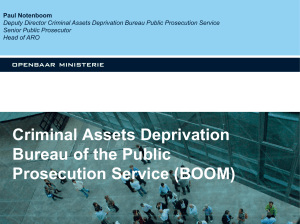France Mr.Badie
advertisement
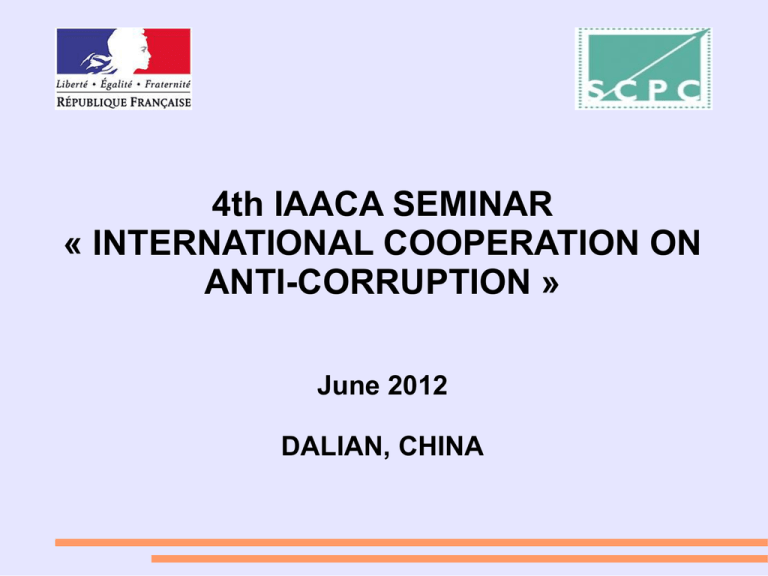
4th IAACA SEMINAR « INTERNATIONAL COOPERATION ON ANTI-CORRUPTION » June 2012 DALIAN, CHINA RECOVERY OF ASSETS COMING FROM CORRUPTION French laws, tools and practices Mr François BADIE Head of the Central Service for the Prevention of Corruption I. THE FRENCH LAWS Law 2010-768 of July 9th, 2010 aiming at making easier seizure and confiscation in criminal matters This Law aimed at developing the seizure of assets during inquiries and proceedings: any confiscable good can be seized Examples: - seizure of all or part inheritance - seizure of real estate - seizure of incorporeal personal properties or of rights - seizure without dispossession It creates a procedure of criminal seizure (not linked to civil procedure) for the purposes of confiscation, which has vocation to apply to all procedures including, those implemented as part of European and international judicial cooperation 3 • Implementation of the 9th of July 2010 legislation for the setting up of the AGRASC (ARMSCA, Agency for the Recovery and Management of Seized and Confiscated Assets), one of the measures introduced to equip French law with up-to-date methods of dealing with criminal seizures and confiscations • The AGRASC is invested with various tasks all designed to improve the seizure, management and subsequent confiscation and sale of crime-related assets • Going beyond its various tasks, it also has a general task of lending assistance to Prosecutors and Judges both as regards national matters and as part of international cooperation • On top of its operational missions (ie. taking care of the seizures of properties in the name of Prosecutors and Judges), the agency will have to make a report every year on its activity which will suggest improvements to be made in the law and the proceedings of seizure and confiscation • On January 1st, 2012, the total amount of the recoveries made by the AGRASC is of 2,3 millions € on more than 102 millions € seized. 4 II. THE TOOLS OF ASSET RECOVERY IN FRANCE A) Existence of specialized services Ministry of Interior: The Central Service for the Repression of Serious Financial Delinquency (OCRGDF) is specialised in money laundering. • Domain of competence: offences of economic, commercial and financial character linked to organized crime, notably terrorism or traffic of drugs. • This Service has a transversal vocation that leads the services of the different ministries to collaborate and to transmit it information related to its activity domain. • Its first mission is to carry out criminal inquiries diligently under the control of the judicial authorities (Office of Public Prosecutor + Judge of Instruction). • Besides, it assures a quadruple mission of centralisation of the criminal information of its domain of competence, the analysis of this information, its translation in terms of prevention and training programmes. 5 Platform of Identification of Criminal Assets (PIAC): * Created in 2005 and attached to the Central Service for the Repression of Serious Financial Delinquency (OCRGDF) * Interministerial composition. * Its objectives are to improve the identification of the heritage of the delinquents as well as to allow a better application of texts related to freezing, seizures and confiscations * The PIAC has 3 main missions: 1) Centralise, analyse and redistribute information 2) Bring a support to the ongoing criminal inquiries 3) Carry out initiative of inquiries The PIAC is an efficient tool. For example, in 2010, it was able to apprehend a total of criminal assets estimated at 154 447 279 Euros; in 2011, the PIAC seized 247 481 448 Euros. 6 Central Brigade of Fight against Corruption (BCLC): * Created in 2004 within the National Direction of Financial Investigations (DNIFF) and devoted to the repression of corruption. * Interministerial composition * Mission: «Undertake any useful acts of inquiries related to facts of corruption, to constituting facts of breach of duty of probity, as well as misuses of company property, of forgery or accounting offences, likely to have been made in relation with aforementioned offences» * Means of action are inquiries (of its own initiative either on submission of the Public Prosecution or on rogatory commission); exchanges with the European counterparts; training actions; participation in jobs of international authorities 7 B) French solution to « prosecute dirty money » 1. Asset tracing tools Important questions to answer to: - How to find out if a natural or legal person has bank accounts in a country? => Bank and similar accounts register (FICOBA), Ministry of Finances - How to find out if a natural or legal person owns a company/business registered in a country? => National heritage database - How to find out if a natural or legal person has non banking financial interests in a country? => Trade and Companies Register - How to find out if a natural or a legal person owns luxury goods such as boats or planes registered in a country? => Various Registers 8 2. The confiscation of criminally acquired assets a) Main principles - French in personam approach - Confiscations ordered against an offender as an additional penalty may involve properties owned by other people, if they had contributed to commission of the offence or acquired with the profits from the offence - Confiscation of properties is incurred in cases specified by law or the regulations and, as a matter of law, criminal offences punishable by imprisonment for more than one year, except for press offences - Relatives of a guilty person (family, other people in regular contact with the perpetrator or other persons involved in a criminal organization) may also be sentenced, and confiscation of their assets may be ordered. 9 III. IMPLEMENTATION OF THE COOPERATION IN ASSET RECOVERY MATTERS - PRINCIPLES AND PRACTICES - French legislation knows widely all conservatory possibilities (freezing etc.) but the confiscation is only possible in the framework of a conviction sentence; - Consequently difficulties arise when requests for mutual legal assistance for return of assets (movable or immovable property) are not based on decisions of conviction (Non Convicted Based Proceedings) 10 - However, judicial developments helped to bring closer the two types of procedures in 2 judgments of the Court of Cassation (before even the adoption of the Act of 2010): => in judgments of November 13, 2003 and June 4, 2009, the Court of Cassation acknowledged the validity of requests for mutual assistance in the execution of measures of confiscation of property which were not based on a decision of conviction; => therefore, the French Supreme Court admitted the concept of "preventive confiscation", not based on a determination of guilt, as that can give rise to requests for mutual legal assistance; => Two conditions are necessary: 1) The decision whose enforcement is requested must be legally binding in a final judgment 2) The property forfeited in this case must concerned a situation where in French law the confiscation could also be possible. 11 ABOUT THE REQUESTS • • - - - - Difficulties are often related to the procedure (need to respect channels of MLA, the diplomatic formalities of requests, necessity of translation etc.) to be held in a proper legal framework; these difficulties however can be lifted by the direct contact between the concerned services. Difficulties also arise from the difference between civil law and common law. For requesting States: Improve capacities of access to mutual assistance: know the cooperation procedures, respect the rules, formalise the demands (precision of the commissioning authority, statement of the facts, referring to texts, translations, etc.); Requirement of precision in the statement of the facts, in the concrete demands and their legal framework (seizure or confiscation), a precise description of the good, its link with the infraction and the judicial procedure referred to; Pitfall to avoid: purely political presentation. The impatience of the requiring States is legitimate: the rapidity of the mutual assistance is conditioned by a long but necessary procedure and only that way will the result be real and effective. For requested States: Existence of an adequate legislation [for France: law of July 9th, 2010, creation of the AGRASC], new operational and legal tools conform to the international requirements, strong political will (UNCAC). 12 The example of Mutual Legal Assistance (MLA) in the « Arab Spring » context -For Tunisia: several demands are currently dealt with and concern about 50 persons; - For Egypt: about 15 demands of cooperation are in process; - About those two States, an operational meeting took place in EUROJUST (the Hague) in December 2011 at the initiative of the French representative in order to support and coordinate their asset recovery demands; - The meeting was followed by local visits in both States of French specialists of mutual legal assistance and asset recovery. 13 CONCLUSION => Recovering assets is complex but some significant progress has been made in France as well as at the international level => Solving this problem is our challenge => To be successful there must be a strong and sustained political will (G20 – ACWG) => Recovering stolen assets as part as the governance reform => Reinforce international cooperation is necessary to achieve our goal 14 THANK YOU FOR YOUR ATTENTION!
